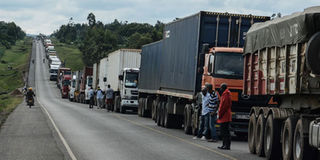Prime
End non-trade barriers to boost regional markets

Affected. Trucks wait in a line on the road to enter Uganda through Malaba Border on April 29. All cargo truck drivers are subjected to a mandatory Covid-19 test before entering the country.
What you need to know:
- The issue: African market
- Our view: African governments must also work together to remove Non-Tariff Barriers (NTBs) that make trading difficult. SMEs, among other businesses, face several obstacles to trade ranging
The Africa Continental Free Trade Area is just one step towards creating a continental market. The single market that kicked-off at the beginning of this year, offers Africa the best opportunity to remake itself following the devastating impact of coronavirus.
But are African countries genuinely as pan-African as they claim to be? Do they have national interest at heart? How will the AFCTA work where some other regional blocs have hit a snag? If the same goals have not been attained at a regional level, how then will the same goals be attained at continental level?
Currently, African countries trade more with Europe than with each other. Intra-Africa trade remains low at 15 per cent compared to Europe’s 68 per cent, North America’s 37 per cent and Latin America’s 20 per cent, solely blamed on “national” interests by member states keen on safeguarding their own industries, trade barriers and poor transport and telecommunication connectivity.
Before we rush into celebrating this milestone, some teething problems must be overcome for the continent to reap the full benefits of this free trade zone.
Africa, whose competitive advantage lies in agriculture, must do more to ensure that Small and Medium Enterprises (SMEs) tap into the opportunities of this single market. But winning in farming will involve huge investments.
The fact that Africa is still as a source of raw materials for many products and value is added elsewhere, means there is more work to do. Governments must be willing to invest heavily in industrialisation to change this.
SMEs, which account for nearly 80 per cent of jobs created on the continent, must be equipped to get a slice of these opportunities from this African market.
For African SMEs to reap the benefits of this free trade zone, they must add value to what they produce and this calls for the development of industries as well.
This will require our raw materials to be processed at home and sold elsewhere as finished goods. It also requires governments to invest in more capacity for processing, packaging, and exporting.
Besides, governments must also work together to remove Non-Tariff Barriers (NTBs) that make trading difficult. SMEs, among other businesses, face several obstacles to trade ranging from quotas to excessive import documents or unreasonable packaging requirements.
Such barriers are a big hindrance to trade between African countries and make it complicated and expensive to move goods across the continent.
The success of the free trade area depends on how soon African governments can work together to eliminate NTBs.




